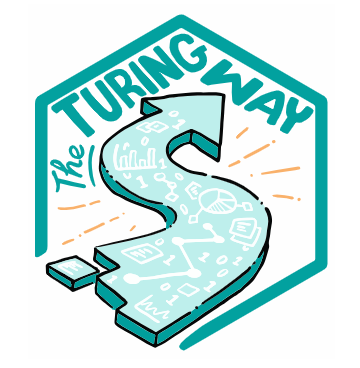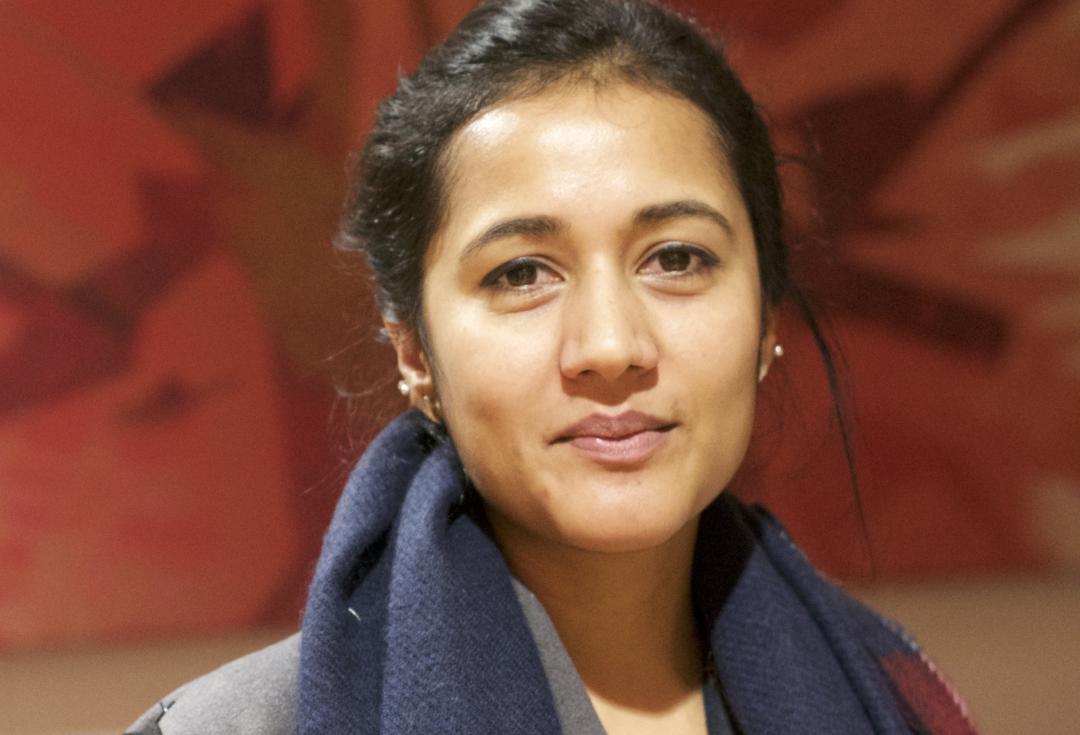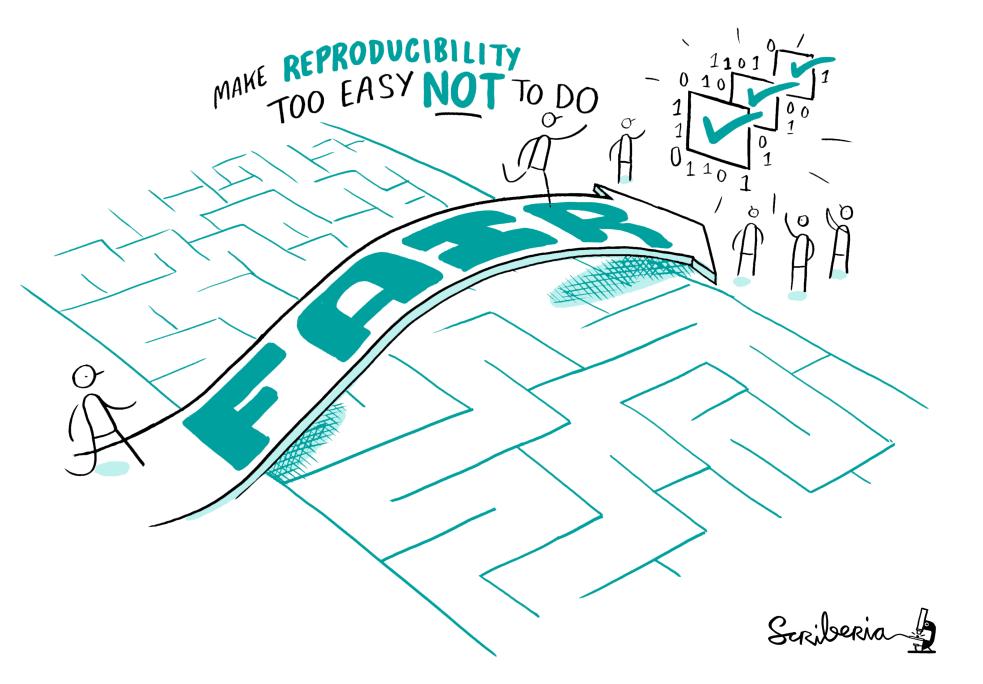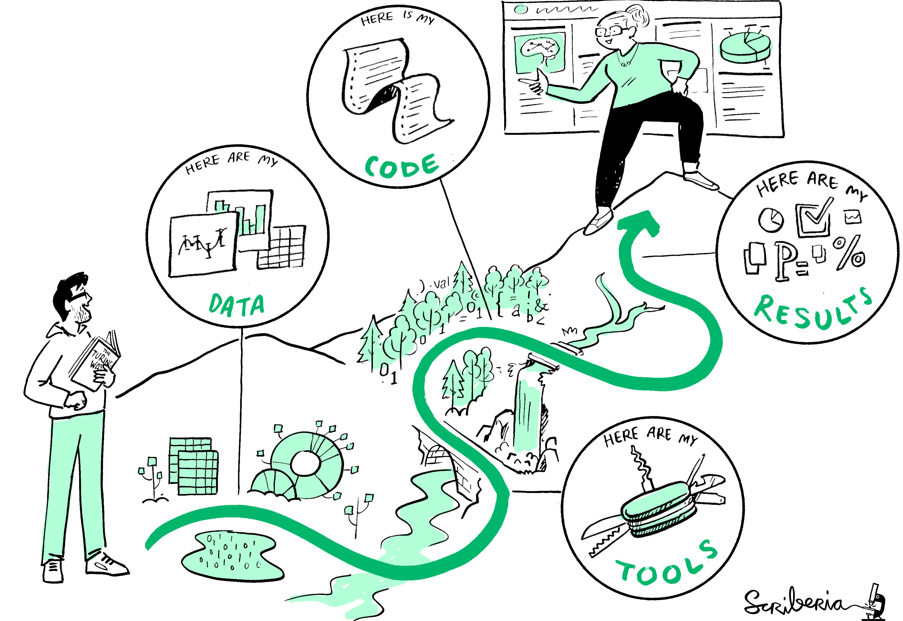The Turing Way
The Turing Way is an open-source, community-led, and collaboratively developed project. It is a handbook and a global community dedicated to making data science and research skills accessible, comprehensible, and beneficial for the wider research community
A case study from Arielle Bennett, Programme Manager at The Alan Turing Institute

The Turing Way project has brought together individuals and organisations from diverse sectors and domain-expertise to share practices and resources. Online guides were created to highlight topics such as research reproducibility, project design, collaboration, communication, and ethics. These resources have been shared through more than 350 handbook chapters developed collaboratively by nearly 500 contributors and accessed by over 6000 users monthly worldwide.
The project was created and developed by a core team of organisers, researchers, and collaborators, as well as more than 450 diverse contributors from international organisations and communities.
This work was funded by The Alan Turing Institute and The Turing Way Practitioners Hub as well as external funding from:
Purpose
Launched in 2019, The Turing Way is a flagship project of The Alan Turing Institute - UK’s national institute for data science and artificial intelligence (AI) - with contributors and users from across the globe.
The project consists of four elements: a handbook, a community, open source/science as praxis, and a global collaboration. The moonshot goal is to make research reproducibility “too easy not to do.”
The Turing Way community's mission is to make data science reproducible, transparent, collaborative, and reusable. The handbook is an open-source and community-driven series of guides on best practices for responsible data science, embedding considerations for ethical research and innovation, collaboration, communication, project design, and reproducibility.
The Turing Way community comprises data scientists, project managers, students, industry experts, data stewards and many others, some of whom have never contributed to open-source projects before. Everyone is encouraged to participate in the community and meaningfully contribute to the guides.
As a result of the intentional care given towards community involvement and leadership, it is now a vibrant space of nearly 500 diverse contributors and an even broader set of users from across the world. The community is given opportunities to hone a host of skills ranging from gaining subject matter knowledge covered in the handbook to aspects of maintaining and sustaining a large-scale international project such as The Turing Way.
Background
The Turing Way was founded at The Alan Turing Institute by Dr Kirstie Whitaker, Programme Director for Tools, Practices and Systems. In collaboration with other researchers who advocated for open and reproducibility practices, she gained funding in 2018 as part of the AI for Science and Government investment (part of the UKRI Strategic Priorities Fund) to create a guide for reproducibility.
Subsequent funding was received in 2019 to expand the scope of the project, adding new guides on project design, communication, collaboration, and research ethics, alongside a community handbook to improve the contribution pathways and reusability of the open-source processes.
In 2023, Innovate UK BridgeAI programme invested in the project to create The Turing Way Practitioners Hub, led by Dr Malvika Sharan (a co-lead of The Turing Way). This was part of the Turing’s efforts in building data science and AI skills across small- and medium-size enterprises in the UK.
With openness and collaboration at its heart, this five-year funded meta-project has produced a thriving global community. All resources are openly developed, managed and shared online via a GitHub organisation. Both the project and its community are maintained and supported by a team of the Turing staff and volunteer members.
What started out as one handbook, has now become a well-known reference source for the research community, providing a template for community-led co-creation of best practice in data sciences.
I have a vision, and I am driving it forward, but The Turing Way doesn't belong to me, and it isn't written by me. Literally anyone can contribute. That’s the special sauce of the project.

Everyone who contributes to this book, no matter how small or big their contributions are, is recognised in this project as a contributor and a community member.
Evaluation
The Turing Way has had national and international impact, informing the Health Foundation, UK government strategy on data analysis reproducibility, and NASA’s Transform to Open Science (TOPS) initiative. A set of case studies developed in direct partnership with five national organisations and BridgeAI programme share how The Turing Way is contributing to the adoption of data skills across different sectors.
The Turing Way handbook currently has:
- 372 live subchapters across 85 chapters with 5.5k average views monthly
- 457 Contributors on GitHub
- Starred by 1800+ users
- Forked by 604+ users
- Resources shared openly on Zenodo with 55k views and 22k downloads
Lessons Learned
The learning on this ongoing project is continuous, arising from feedback from community members and new contributors and every time an event or co-working session is hosted.
One of the key lessons that have emerged is that while moving at the speed of the community might feel slower in the short-term, it provides sustainability for the community and relationship-building in the long-term.
This pace of movement, together with creating pathways for people to get more involved and take on responsibility, also gives people agency and has empowered some to take on leadership roles within the Turing Way community.
A cautionary learning point is the need for an explicit governance structure in place from the start for a project that involves so many people.
If a governance structure is not explicitly clear then this can be taken as a sign of the presence of an implicit hierarchy. It's critical to have clear pathways for people to participate and to know how and when they can.
For The Turing Way, this has meant identifying and discussing three different types of participation and involvement: constitutional members, who make decisions that require knowledge of the whole project over a long time frame, maintainers in working groups which focus on specific areas and decisions that require longer term engagement and more specialised expertise, and the community level, where everyone who complies with the projects' code of conduct can participate in GitHub discussions, Slack, community forums, and events.
Legacy
The Turing Way has influenced a number of organisations' approach to best practice in data science. The project has been cited by over 10 organisations as explicitly inspiring their own working practices and approaches to data science and AI, including the NHS, ONS, NASA, British Antarctic Survey, Genomics England, and others. Publication citations number over 100, and the project community gives upwards of 50 talks and workshops a year.
Dr Sharan advises NASA’s Transform to Open Science (TOPS) initiative and The Turing Way is considered invaluable in the development of NASA’s OpenCore curriculum targeting NASA scientists.
The project has also served as inspiration for how some organisations can go about producing their own handbooks. For instance, UCL’s Institute of Health Informatics Code Club acknowledge that their handbook is “heavily inspired” by The Turing Way. The operations team behind The Turing Way expect the handbook to keep evolving and sparking inspiration for other best practice guides.
In addition to The Turing Way Practitioners Hub, another lasting legacy of the project will be the global community it has fostered. And further, the way this community-led working structure has made more visible so many ‘behind-the-scenes’ and community research roles crucial in R&D.
This has included developers, data community managers, citizen science advocates, and public engagement specialists, people who are all equally invaluable to responsible R&D in data science.
Resources
The Turing Way received its support and funding from EPSRC’s AI for Science and Government (ASG) grant given to The Alan Turing Institute in 2018, through UKRI’s Strategic Priorities Fund, specifically under the Tools, Practices & Systems theme.
Some capacity within the team was also supported by the EPSRC’s Ecosystem Leadership Award given to the The Alan Turing Institute.
The Turing Way Practitioners Hub is funded by Innovate UK’s BridgeAI programme. Additionally, some collaborators also received other funding, on an individual basis, to participate in the project.
Find out more and get in touch
Read more about the project:
The illustrations in this article have been created by Scriberia with The Turing Way community. Used under a CC-BY 4.0 licence. DOI: 10.5281/zenodo.3332807

